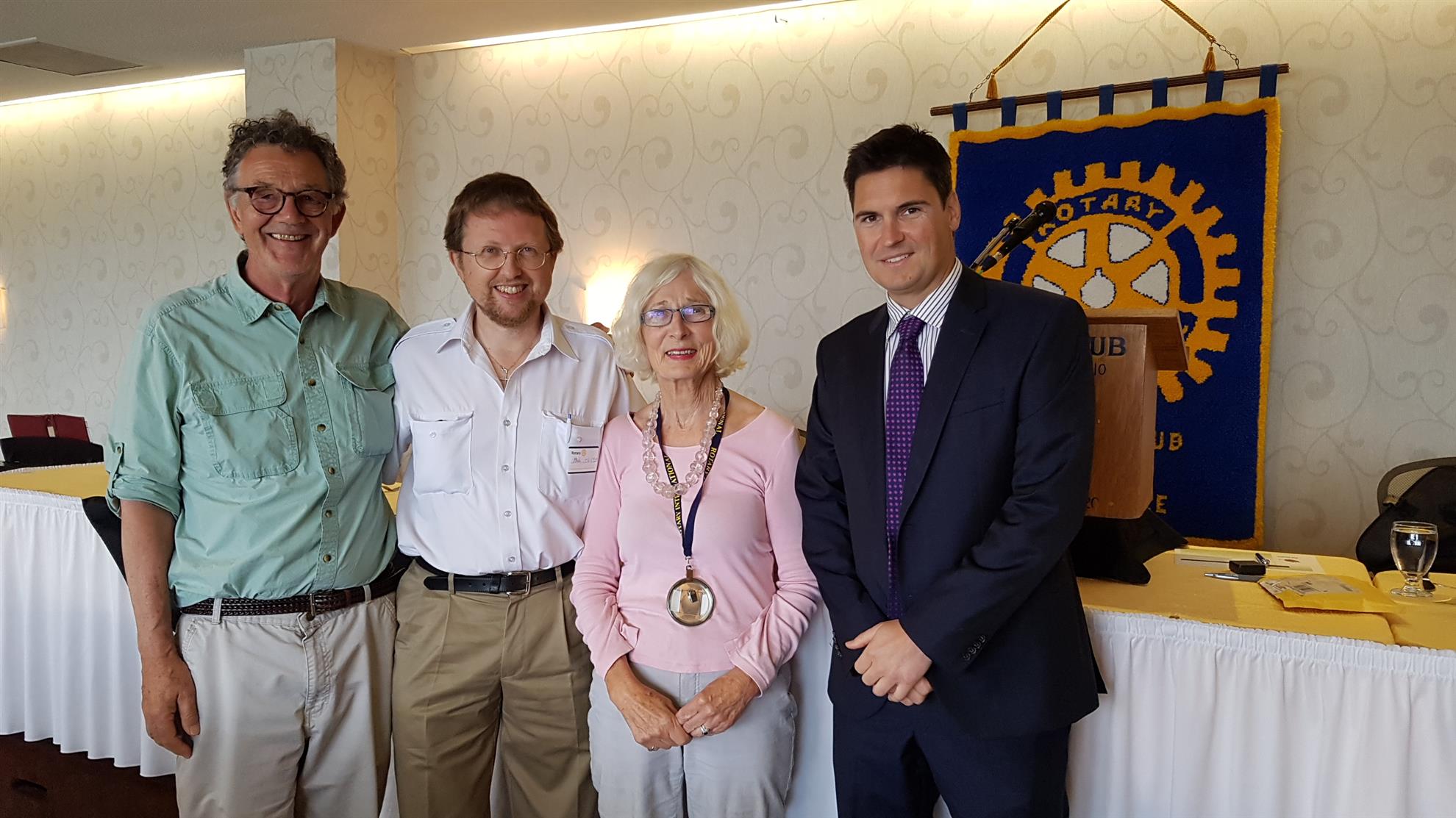
Dr. Ruth Mathieson was very pleased to introduce Dr. Paul Thistle (pictured second from left with Ken Dickson, Dr. Ruth Mathieson and President Andrew Bandler) to the Rotary Club of Belleville. Dr. Thistle received his medical degree and fellowship in obstetrics and gynaecology from the University of Toronto. He is an honourary lecturer at the University of Zimbabwe and Associate Professor at the University of Toronto. In 2005 Dr. Thistle received an Honourary Doctorate of Laws from the University of Windsor, a Paul Harris Fellowship from Rotary International and an inaugural Teasedale Humanitarian Award from the Royal College of Physicians and Surgeons of Canada. For the past 24 years, Paul has worked as a medical missionary in Zimbabwe, first as Chief Medical Officer at the Salvation Army Howard Hospital from 1995 - 2012 and most recently at Karanda Hospital from 2012. Paul is married to Pedrinah, a Zimbabwean born nurse educator and midwife. They have three sons. Dr. Thistle has done an amazing work on a shoestring budget, especially in the field of HIV/AIDS and continues to do so. Over the years, our Club has tried to help him by sending medications, hospital equipment and medical supplies as well as money to help with day to day living expenses.
Dr. Paul Thistle was very pleased to be here to share some of the work currently being done at Karanda Mission Hospital. It's a very rough road to get to the hospital and people have to cross a swollen river to get there. Crocodiles live in the river and people come from hundreds of miles away, taking days to get there.
Karanda Mission Hospital was established in 1961 to meet the needs of mission stations in the Zambezi River valley which were established as churches and then, as the abundant health care challenges were seen, small dispensaries/clinics were developed along with churches and finally schools. To help the clinics, the hospital was built. Karanda is in a remote area of Northern Zimbabwe nearest to Mount Darwin. Its location is approximately 124 miles from Harare, the Capital of Zimbabwe.
The mission complex has a 3 year nurse training school for around 55 students, a 1 year midwifery program, and a primary school offering grades 1-7 for children of the hospital staff. The hospital also offers a Home Based care program that ministers to the needs of widows, orphans and those with HIV. It works with the Evangelical church, a non-denominational church, very similar in doctrine to the Evangelical Free church in the United States. Karanda has 5 chaplains who help to meet the spiritual needs of the patients through daily ward devotions, evangelization, and counseling for grief when a patient dies or for end of life issues for those with terminal diseases. Karanda takes the evangelistic mission very seriously.
The hospital is licensed for 150 beds and on an average work day performs between 15-30 surgeries and sees 200-300 outpatients. The facility is known for the large number of surgical cases it handles as well as treating HIV/AIDS, TB, obstetrics, and hydrocephalus. Karanda performs over 4,000 surgical cases annually and has two full time surgeons (a General surgeon and an OBGYN), and a little help from some visitors. In addition to the two surgeons, Karanda also has a Physician’s assistant and a General practitioner . During parts of the year Karanda also has 2 interns from the University of Zimbabwe and medical volunteers from overseas. The patient population is drawn from the entire country as people seek affordable, reliable, compassionate healthcare. Some facts about the hospital:
- 130 Bed Hospital
- 55 Nursing Students
- 3,500-4,000 surgeries annually (major and minor)
- 2,000 deliveries annually
- 200-300 outpatients daily
